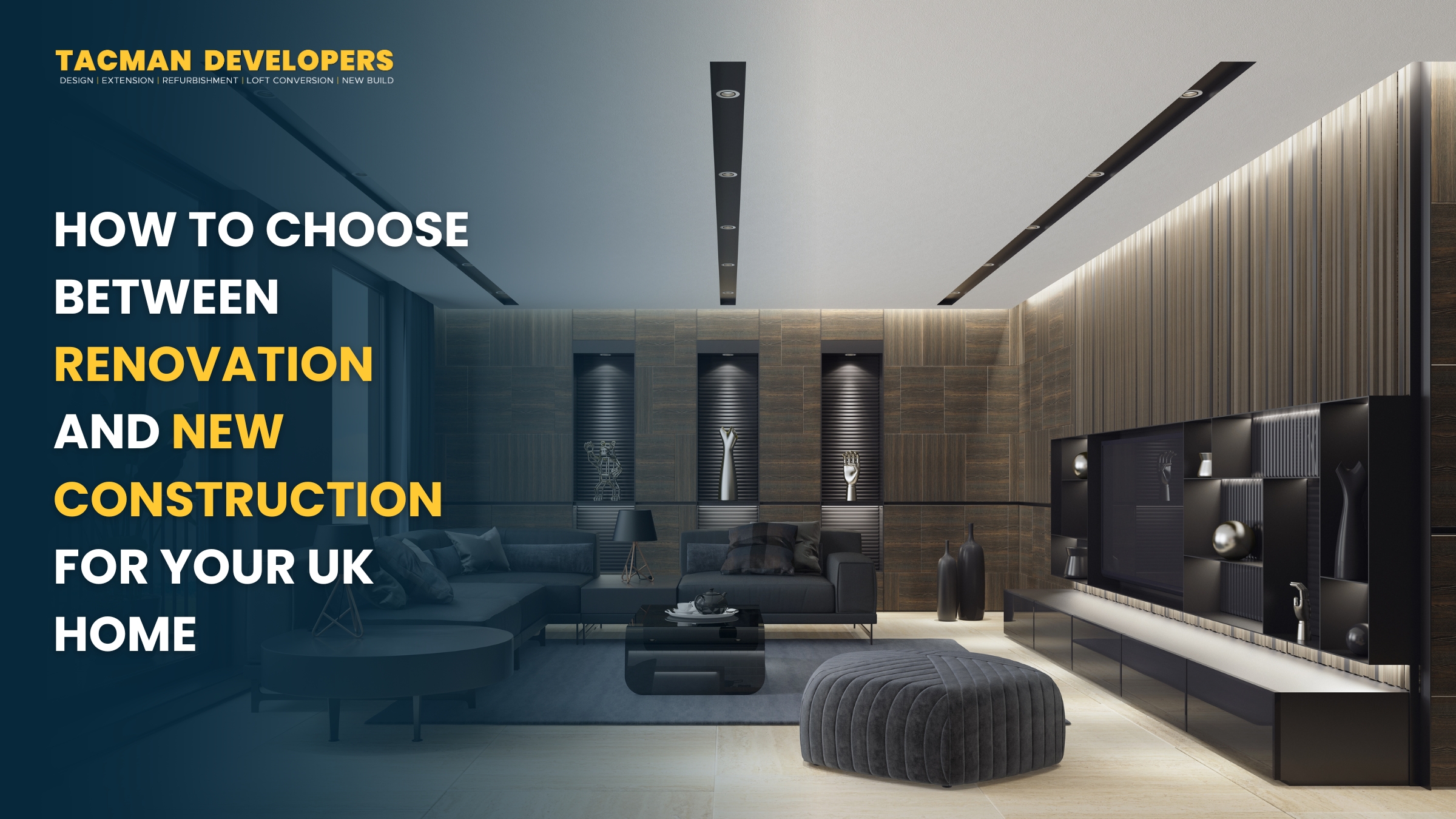Renovation vs New Construction: How to Decide for Your Home
Deciding between renovation vs new construction comes down to budget, property condition, and your long-term vision. Renovation is often best if you want to preserve character and location while upgrading functionality. New construction, however, offers complete design freedom, modern standards, and higher energy efficiency. The right choice depends on whether you value heritage or a fully customised future-ready home.
For homeowners in the UK, one of the biggest decisions when upgrading a property is whether to opt for a renovation vs new construction. Both routes offer unique benefits, but they also come with challenges related to cost, time, and lifestyle impact. According to a 2024 report from the UK Home Builders Federation, nearly 42% of homeowners considering property upgrades were split between renovating existing homes and starting new builds. The decision often comes down to budget flexibility, future goals, and the property’s current condition. By weighing the pros and cons of renovation vs new construction, you can better align your investment with your long-term vision.
Difference Between Renovation and New Construction
A home renovation UK project typically involves upgrading, modernising, or restructuring an existing property. This can range from updating kitchens and bathrooms to full-scale extensions and loft conversions. Renovations are ideal for preserving a home’s character while introducing modern functionality. On the other hand, new construction means building from the ground up, allowing homeowners to design a property that meets their exact specifications without compromise. Both approaches can add value to your home, but they differ significantly in cost, timeframes, and creative control.
Cost Considerations: Renovation vs New Construction
When comparing renovation vs new construction, cost is often the deciding factor. Renovations may seem cheaper upfront, with projects like kitchen updates averaging £8,000–£12,000 in the UK, but unexpected issues such as damp, structural weaknesses, or outdated wiring can quickly escalate expenses. Meanwhile, new builds in the UK average around £2,400 per square metre, offering predictability in cost but requiring higher initial capital.
| Factor | Renovation Costs (UK Avg.) | New Construction Costs (UK Avg.) |
| Kitchen Upgrade | £8,000–£12,000 | N/A (part of full build) |
| Bathroom Renovation | £5,000–£7,500 | N/A |
| Full New Build | Case dependent | £2,400 per sq. metre |
| Loft Conversion | £35,000–£50,000 | N/A |
The table shows that while home renovation UK projects may seem smaller in scale, a combination of upgrades can quickly equal the investment of a modest new build.
Timeframes and Project Duration
Another important factor is the time it takes to complete a project. Renovations can often be carried out in phases, allowing homeowners to remain in the property during construction. However, this convenience may extend timelines, especially if unexpected challenges surface. In contrast, new construction homes usually have defined start and finish dates, but delays due to planning permissions or supply shortages can extend projects significantly. For homeowners on a strict timeline, new builds may offer clarity, while renovations offer flexibility with gradual improvements.
Lifestyle Impact and Disruption
Renovations, while cost-effective, often disrupt daily life. Living in a property while builders tackle plumbing, electrics, or structural changes can be stressful. Noise, dust, and limited access to rooms make it challenging for families. By contrast, with new construction, the inconvenience is isolated to the build site, and you move in once everything is complete. However, new construction requires temporary housing or renting during the build, which adds additional costs. Homeowners need to weigh whether they prefer living through short-term disruption or managing external relocation logistics.
Long-Term Value: Renovation vs New Construction
From a long-term perspective, both renovation and new builds add property value, but in different ways. Renovations typically enhance functionality and aesthetics while preserving charm, making them appealing in historic UK neighbourhoods. They can increase property value by 10–20% depending on the project type. On the other hand, new construction creates an entirely modern home with energy-efficient designs, smart home integration, and compliance with the latest building standards. This not only ensures higher resale value but also reduces running costs in the long run.
Environmental Impact and Sustainability
In today’s climate-conscious era, sustainability plays a key role in decision-making. Renovations often reuse existing structures, reducing waste and the carbon footprint. Installing energy-efficient appliances, double glazing, or solar panels during a renovation improves performance without full demolition. Meanwhile, new construction homes benefit from advanced materials and eco-friendly designs from the ground up. New homes are very appealing to environmentally aware homeowners because of the UK government’s ambitious targets for lowering carbon emissions in new construction established under the Future Homes Standard (coming in 2025).
Which Option is Right for You?
Renovate If:
You Love Your Location
If your home is in a prime area close to schools, work, or family, renovation lets you upgrade without giving up your neighbourhood.
You Value Character and Charm
Period homes and older properties often have unique features worth keeping. Renovation helps you modernise while preserving heritage.
You Want Gradual Upgrades
Renovations can be done in stages, perfect if you’d rather spread costs over time instead of paying a large upfront amount.
Your Property Has Solid Structure
If the foundations, walls, and roof are in good condition, renovation is more cost-effective than starting from scratch.
Newly Construct If:
You Have Available Land
Building on your own plot means you can design your dream home without the limits of an existing structure.
You Want a Custom Design
A new build gives you complete creative freedom, from layout to finishes, so everything matches your lifestyle.
You Prefer Energy Efficiency
New builds follow the latest UK building standards, making them more energy-efficient and cheaper to run in the long term.
Your Current Home Needs Major Repairs
If your property has structural issues, outdated layouts, or costly repairs, a fresh start with new construction may be the smarter financial choice.
Conclusion
The debate of renovation vs new construction is one every UK homeowner faces at some stage. While renovations allow you to retain the character of your property and gradually improve it, new builds offer complete freedom, modern standards, and efficiency. You can make a decision that fits your current needs and long-term objectives by balancing prices, schedules, lifestyle impact, and long-term worth. Ultimately, the best decision is the one that balances practicality with vision, ensuring your home investment serves you well for years to come.
FAQs
1. Is it cheaper to renovate or build new in the UK?
Renovation is often cheaper upfront, but multiple projects can add up, making costs comparable to a new build.
2. How long does a new build home take in the UK?
On average, a new construction home takes 9–18 months, depending on planning permissions and project size.
3. Do renovations increase property value in the UK?
Yes, renovations like loft conversions and kitchen upgrades can increase value by 10–20%.
4. Which is more sustainable: renovation or new construction?
Renovation reuses existing structures, while new construction integrates eco-friendly designs. Both have sustainable benefits.
5. What factors should guide my choice between renovation and new construction?
Budget, lifestyle needs, property condition, and long-term goals are the key decision factors.





